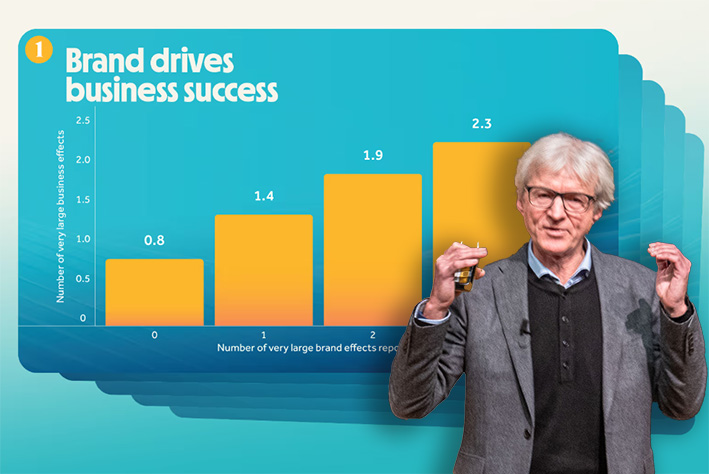Has Peter Field (finally) ended the TV debate?

Opinion
Peter Field has shown us the silver bullet in the argument for advertising. To me, this means brand will assume renewed importance for marketers. About time.
Many are debating exactly what is and isn’t TV.
The streamers protest they are TV too as they eye advertiser budgets that they’ve convinced themselves are ring-fenced for TV. Others continue to argue over what constitutes a view — a discussion in which the fundamentals haven’t changed while the landscape and opportunities within it have.
I’m always interested whenever something new comes from the venerable Peter Field, the go-to guy when it comes to ad effectiveness and that rare thing: a true British (advertising) treasure.
“Five charts to end the TV debate” crept into my feeds recently. It’s an important piece, even if it is but a succinct reassembly of existing work (his for the IPA DataBank, as well as that from Amplified, TVision, Lumen and Ebiquity) by a leader in the field (pun intended).
Has Peter finally distilled the words we needed to express ourselves? The silver bullet in the argument for advertising as opposed to yet more questionable tech?
The true value of TV
Curiously, it came out of a smaller market on the far side of the world: New Zealand. It was prepared for ThinkTV, its iteration of our own Thinkbox, and speaks right into the debate about what constitutes TV from an advertising perspective. Not with semantics, but with metrics associated with effectiveness.
Better still, it’s not a long read. Advertisers will like and understand it:
• TV advertising remains a powerful tool for brand growth
• TV ads capture attention longer, are better remembered and yield a higher return on investment compared with digital video platforms
Peter’s five charts show:
• Brand drives business success
• Longer viewing equals longer recall
• Only 15% of digital video ads make the threshold of recall
• TV holds attention for longer and leaves a lasting impression
• Viewer attention costs less on TV
And it reprises the work of Amplified’s Dr Karen Nelson-Field showing:
• The attention value of an ad viewed for 10 seconds is eight times that of one viewed for five seconds
• An ad needs at least two and a half seconds of attention before any memories are reliably created
These findings speak right into the conversation around how TV works the way it demonstrably does and the true relative value it offers.
They reinforce the arguments for linear and similar TV (eg. connected TV, over-the-top, broadcaster VOD) — but not so much for the new contenders coming from platform backgrounds.
This compact deck, which even the lowliest media planner could embrace and integrate into their outputs, speaks into branding and what actually constitutes TV advertising.
It could also feed very usefully into initiatives about reasserting the value of advertising — and thus bolstering the fees chargeable from miserable current levels.
(The Advertising Association recently highlighted the industry’s contribution to national gross value added, but is mute on this point.)
Brand’s importance
One of my strongest takeouts from The Media Leader‘s Future of Brands event in April was the rapid emergence of AI agents (both marketer and customer) that will take over a lot of routine and even no-so-routine online purchases.
To me, in counterpoint to Aidian Mark’s piece recently, this means branding will assume renewed importance for marketers. About time. The alternative is a race to the bottom on price — neither sustainable nor something you need marketing for.
Madison Avenue strategy doyen and Advertising: Who Cares? participant Michael Farmer asks similar questions in his latest C-Suite Blues Substack: “Does marketing still believe in brand growth?”
And all this at a time when holding companies are hurtling towards principal media buying as the saviour of their share prices — the latest brick in this wall being murmurs of WPP’s proposed 1% media fee and 15% data charge clawed back from the media as it transforms GroupM into WPP Media.
We should thank Peter and ThinkTV.
 Bob Wootton spent 40 years working in advertising, first as a media buyer at some of the UK’s leading agencies before joining the trade body Isba in 1996, where he was advertising and media director for 20 years. He is also the founder of Deconstruction, a media and tech consulting business, and presents The Guitar Show on YouTube.
Bob Wootton spent 40 years working in advertising, first as a media buyer at some of the UK’s leading agencies before joining the trade body Isba in 1996, where he was advertising and media director for 20 years. He is also the founder of Deconstruction, a media and tech consulting business, and presents The Guitar Show on YouTube.




